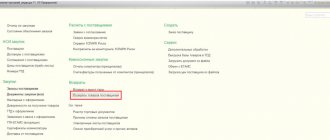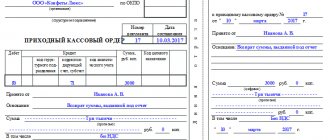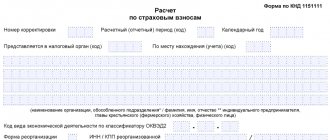Tax risks mean the likelihood that an enterprise will experience adverse legal consequences in the form of financial losses due to the actions of government agencies due to the ambiguity and incorrectness of the processes of imposing mandatory budget payments and tax legislation.
Tax risks may arise for a company not only due to an economic entity pursuing an ineffective internal policy, but also due to the use of the duality of certain provisions related to the payment of tax or the use of rather risky schemes aimed at minimizing the company’s payments to the budget.
Tax risks of business - is there a list?
The emergence of tax risks for a business is a phenomenon caused primarily by the desire of the taxpayer to reduce the amount of taxes paid by legal or illegal means. Although other factors may also be at play:
- lack of awareness of legal provisions or changes thereto;
- insufficient information about counterparties or the nature of the transactions;
- technical errors.
That is, tax risks occur in situations where legal requirements are ignored or violated. The presence of signs of doing business with tax risks is the basis for the tax authority to initiate an on-site audit procedure. The guide to determining the presence/absence of tax risks for an organization or individual entrepreneur contains order of the Federal Tax Service of Russia dated May 30, 2007 No. MM-3-06/ [email protected] , which contains a list of the main criteria for assessing tax risks (Appendix No. 2). This list is not only not closed to taxpayers, but, on the contrary, is recommended for their own use.
Among the criteria indicating the presence of tax risks for an enterprise are:
- presence of: a low level of tax burden compared to the industry average;
- losses over a number of tax periods;
- high share of VAT deductions;
- discrepancies in the growth of income and expenses, indicating a higher rate of increase in the latter;
- low salary level compared to the average for the industry in the region;
- criteria close to the boundary that give the right to use special regimes;
- a high share of individual entrepreneurs’ expenses that reduce the personal income tax they accrue from business activities;
- unreasonable number of intermediaries in the transaction;
- actions indicating reluctance to provide information necessary for tax control;
- frequent changes of places of tax registration;
- low level of profitability of the activities carried out in comparison with the industry average;
- personal interaction between representatives of counterparties when concluding contracts;
Most of these criteria can be classified as influencing the occurrence of risks at the time of concluding a contract and the calculation of the most significant taxes for the budget (VAT and profit). Despite the fact that only legal entities working on the OSNO pay income tax, many of the rules for accounting for income and expenses for it are applied under the simplified tax system. Therefore, these rules also turn out to be significant for organizations and individual entrepreneurs working on imputation.
Regular losses
If an entrepreneur shows losses in tax reporting for two or more years, the Federal Tax Service regards this fact as an attempt to evade taxation. This is especially true in the trade sector. Indeed, what is the point of trading at a loss for such a long period?
A competent entrepreneur will always show minimal profit in order to optimize costs. The main thing is to do this using legal tax instruments without violating the law. And it’s better not to go into the loss zone, otherwise the tax authorities will immediately focus their attention on you.
Tax risks for VAT in 2021
When assessing tax risks for VAT in 2021, one should focus on the amount of the share of deductions established by:
- directively as not exceeding 89% for the year as a whole (clause 3 of Appendix No. 2 to the order of the Federal Tax Service of Russia No. MM-3-06 / [email protected] );
- as a regional average on a quarterly basis based on actual reporting data submitted to the tax authorities.
The latter indicator takes into account the peculiarities of taxation in each region. These features may be determined both by the possibility of applying certain tax benefits, and by the predominance of one or another type of activity, which is reflected in the final amount of the deduction.
About the share of deductions acceptable for regions, read the material “What is the safe share of VAT deductions in your region in 2017-2018?”
A taxpayer whose data on the share of deductions involved in determining the amount of VAT payable for the tax period deviates from the average figure for the region will either have to give the tax authority a convincing explanation of the reasons for such a deviation, or take measures to avoid deviations. The latter, in particular, can be achieved using the possibility of applying deferred deductions (clause 1.1 of Article 172 of the Tax Code of the Russian Federation).
Low wages for workers
Failure to comply with labor laws can also lead an entrepreneur to a tax audit. At the same time, the Federal Tax Service takes into account both direct and indirect evidence of violations. Direct messages include messages and complaints from employees and regulatory authorities about non-compliance with labor laws, untimely payment of wages, their issuance in “envelopes”, etc.
Any offended employee can report a salary in an envelope to the Federal Tax Service
And indirect signs of violation of labor laws include low wages. If an entrepreneur officially pays his employees only the minimum wage, then this is a reason for the Federal Tax Service to check such a taxpayer. After all, it’s strange when the average salary of a salesperson in the region is 20 thousand rubles, and people work in a fairly successful store for only 12 thousand rubles.
Entrepreneurs can independently monitor the average wage level in the region on which the Federal Tax Service relies. This information is regularly posted on regional Rosstat websites. Therefore, it is in the interests of businessmen to pay workers decent official wages. This is one way to avoid a tax audit.
Enterprise income tax risks
If the tax risks arising when concluding an agreement or when working with VAT concern both legal entities and individual entrepreneurs, then exclusively the tax risks of the organization include tax risks for income tax (provided that the organization operates on OSNO).
In connection with income tax, risks arise primarily in relation to the validity of expenses taken into account in reducing the base for this tax. The role here will be played by:
- presence/absence of suppliers classified as problematic counterparties and dubious transactions;
- reasonableness of prices used in transactions with suppliers;
- compliance of costs with the criteria for the possibility of accepting them as expenses, including in terms of reference to the limits established for this;
- the ratio of income and expenses, which is reflected, among other things, in the level of profitability of the activities carried out;
- validity of losses of previous years.
Simplifiers (both legal entities and individual entrepreneurs) working with the “income minus expenses” object will have to focus on similar indicators.
To learn about which expenses under the simplified tax system are taken into account according to the rules of Chapter 25, read the article “List of expenses under the simplified tax system “income minus expenses”.”
Working with suspicious counterparties
The Tax Service is constantly looking for and identifying fictitious accounts created for money laundering and illegal understatement of the tax base. Moreover, not only the suspicious companies themselves, but also their counterparties are targeted. Therefore, cash payments made by entrepreneurs are a direct basis for conducting an audit.
Administrative liability is provided for knowingly working with fictitious companies.
Tax authorities are also suspicious of the supply of goods through a chain of intermediaries, especially if they are registered at the same address or under the same owner. After all, this scheme of work is often used to evade taxes. Therefore, to avoid a tax audit, you need to carefully check your suppliers.
Tax risk management
The tax risk management process involves:
- organizing work only with trusted counterparties;
- following rules that do not go beyond the current legislation in matters of determining tax bases and total amounts of tax payments;
- compliance with digital indicators considered acceptable by the tax authority for a tax/expense of a certain type;
- systematic analysis of business results and its tax consequences.
A taxpayer who doubts the possibility of accepting the results of any transactions for tax accounting is recommended to exclude them from tax calculations (clause 12 of Appendix No. 2 to the order of the Federal Tax Service of Russia No. MM-3-06 / [email protected] ). If such transactions were taken into account when preparing tax reporting, this reporting should be clarified, accompanied by an explanatory note. Such actions will reduce the risk of conducting an on-site tax audit.
Disproportional income growth
If the declared income of an entrepreneur systematically grows, and the profit paid to the budget remains at the same level, then it will not be possible to avoid a tax audit. In this case, the Federal Tax Service believes that in order to optimize taxation, the taxpayer is overestimating expenses.
As income increases, profits should increase
A similar situation is often observed when expanding a business, but the tax authorities will understand the situation directly during the audit.
The ECAM warehouse accounting program will help you avoid a visit from the tax authorities and quickly increase profits when opening a new store. It is able to analyze sales and identify the most profitable assortment items, which allows you to increase net income in proportion to revenue. This will reduce the attention of tax authorities to the enterprise.
In addition, the warehouse accounting program helps create accurate tax reports, ensuring smooth execution of possible Federal Tax Service audits.
Results
Conducting commercial activities is accompanied by tax risks resulting from non-compliance with tax laws. The list of signs indicating the presence of risks is given in the order of the Federal Tax Service of Russia No. MM-3-06 / [email protected] The main of these signs relate to the issues of concluding contracts, calculating VAT and income tax.
Risks can be managed, including reduced by submitting updated tax reporting to the tax authority. You can find more complete information on the topic in ConsultantPlus. Free trial access to the system for 2 days.
Ignoring tax demands
Entrepreneurs regularly submit declarations and reports to the tax office. Increasingly, this is done through the taxpayer’s electronic account.
Entrepreneurs are advised to regularly check their personal account on the Federal Tax Service website
If there are inconsistencies in the reporting provided, the Federal Tax Service may send an email to the entrepreneur in order to correct or clarify the identified violations. Failure to respond to this on the part of the taxpayer within 5 working days is grounds for conducting an unscheduled inspection.
The Federal Tax Service can also send its notifications by regular mail. In any case, the entrepreneur must respond to them and provide an answer within 5 days. This is the only way to avoid a tax audit.
Who should be afraid
Not only owners, but also employees - risk falling under liability . After all, they are the ones responsible for the direct transfer of funds; their signatures are on the documents. There are cases when the courts found the first persons guilty of withdrawing large sums, while the owners remained on the sidelines. After all, when it comes to a major transaction, the decision must be made by the founders. And if there is no document confirming such a decision, it turns out that the director or chief accountant transferred the funds at their own discretion, without asking the owners.
Chief accountants are especially vulnerable in this regard . Often there is a situation where, in the absence of the director, the chief accountant manages funds and uses the electronic signature of the director. When the tax office has questions, the director says that he has nothing to do with it, since he did not sign the document, and in general was abroad at that time. As a result, all responsibility is transferred to the chief accountant.
It is advisable for the person who signs the payment document to do this after carefully studying the agreement, as well as after checking the counterparty. This will significantly increase the chance that funds will not be transferred to a dubious organization.
The chief accountant may also fall under administrative liability , and for this, the amount of arrears should not be in the millions. For a primary violation, a fine will be imposed, and for a secondary violation, they may be disqualified. Such penalties will occur for a number of offenses:
- Lack of mandatory audit report.
- Distortions of data in financial statements by more than 10%.
- Lack of primary documents and financial statements.
Even if the company goes bankrupt, its top persons are liable for its debts for 3 years. This is spelled out in the new version of the bankruptcy law. And Article 45 of the Tax Code of the Russian Federation states that anyone can pay taxes for a company. Thus, if an individual is found guilty of non-payment of company taxes, it is from him that they can be collected.
One area that has received a lot of attention lately is the appointment of nominees to leadership positions. If it turns out that the director does not actually manage the company, then work will be carried out to determine the real beneficiary. It is he who will be held responsible for tax violations.








